In today’s digital-first world, a strong online reputation management (ORM) strategy is as critical to small businesses as their in-store experience. With most consumers turning to the internet before making a purchase, ignoring your online presence can be costly.
This blog outlines what an effective ORM strategy entails and shares ten impactful techniques small businesses can use to enhance their visibility and trust online. Plus, we’ll show how Convin’s AI-powered tools can give your strategy a competitive edge.
Power up strategy and decisions with Convin today!
What Is an ORM Strategy for Online Reputation Management?
Online reputation management (ORM) strategies are the practices and techniques businesses use to influence and improve how they are perceived online.
These strategies aim to monitor, identify, and influence the online sentiment about a business, ensuring that the positive aspects are at the forefront while addressing any negative feedback effectively.
- Understanding ORM Strategy: An ORM strategy involves monitoring and influencing a business’s online image, essential for maintaining brand credibility in the digital space.
- Implementing ORM Tactics: This includes engaging with reviews, social media interactions, and public content to reflect brand values and manage perception.
- Reputation Online Management: Focuses on shaping how a business is viewed online through review handling, content control, and social engagement.
- Business-Focused ORM: Ensures potential customers find positive and relevant content when researching a business online, influencing decision-making.
- ORM Tools: Tools help track mentions, analyze sentiment, and manage online interactions to protect and enhance brand reputation.
- Types of ORM: Includes SEO for search visibility, content creation for brand image, and social media management to influence public sentiment.
By integrating these elements into a comprehensive ORM strategy, businesses can proactively manage their online presence, address issues before they escalate, and foster a positive online reputation that aligns with their brand values and goals.
Push Live Battlecards to Win Critical Moments.
What Are the Key Components of a Strong ORM Strategy?
A successful reputation management strategy is built on multiple interconnected components that influence how a brand is perceived online. From customer reviews and social media activity to search engine visibility, each element plays a critical role in shaping and maintaining a company’s digital reputation.
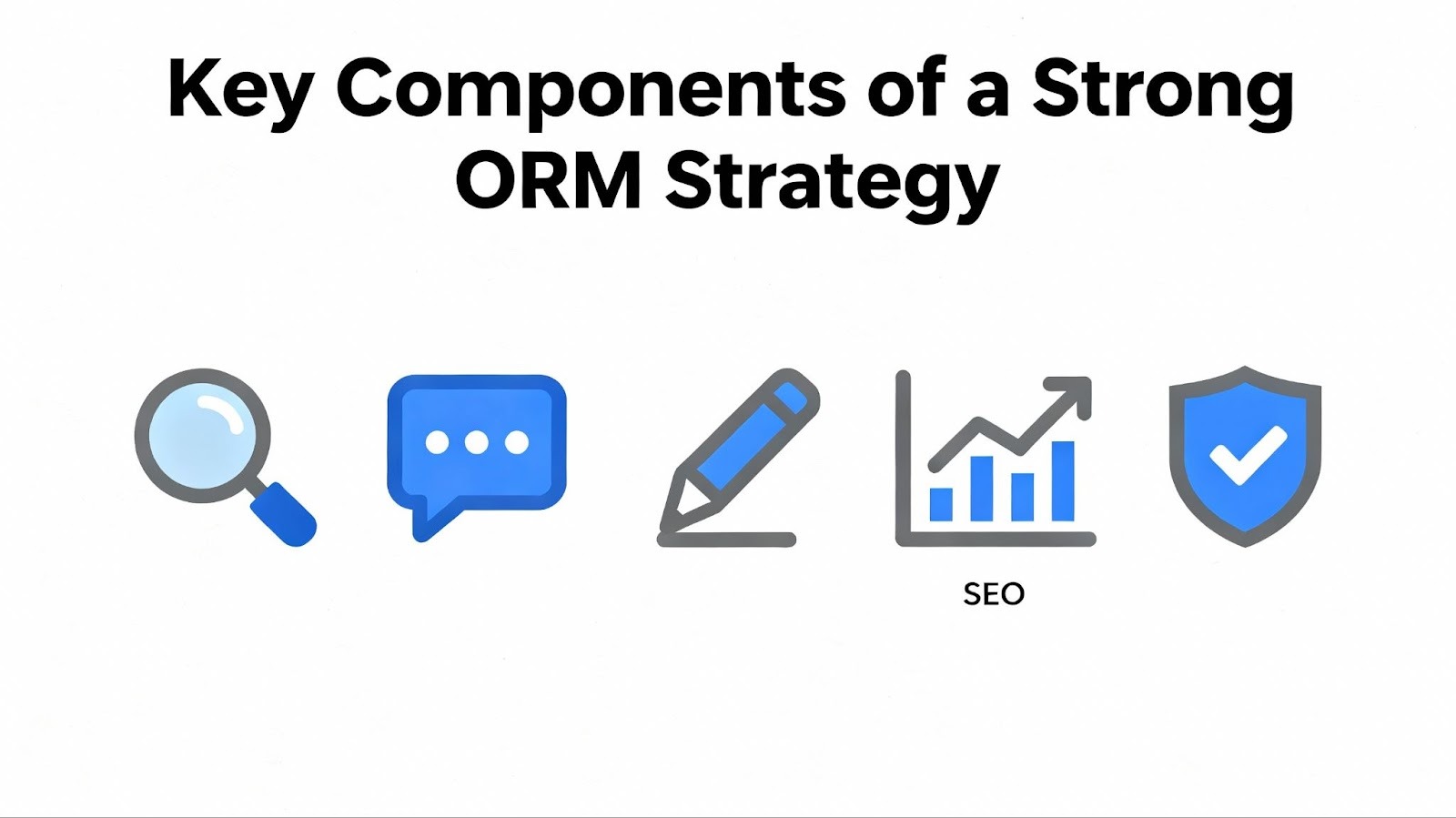
Understanding these pillars is the first step toward crafting a comprehensive online reputation management strategy that builds trust, attracts customers, and safeguards brand credibility.
1. Components of Online Reputation
a. Customer Reviews and Feedback
- Direct Feedback: Customer reviews provide consumers with direct feedback, providing insights into their experiences and satisfaction levels.
- Influence on Perceptions: Potential customers often base their expectations and decisions on the experiences of others, making reviews a powerful influence on a company's reputation.
- Response Strategy: How a company addresses reviews, both positive and negative, can significantly shape its online reputation, demonstrating its commitment to customer satisfaction.
b. Social Media Presence
- Engagement and Interaction: Active and positive engagement on social media helps build a community around a brand, encouraging loyalty and advocacy.
- Brand Persona: Social media offers a platform for companies to showcase their brand personality, values, and responsiveness, all of which contribute to their online reputation.
- Crisis Response: The ability to quickly and effectively handle any negative incidents on social media can prevent potential damage to a company's reputation.
c. Search Engine Results
- Visibility: High-ranking positive content in search engine results enhances a company's visibility and credibility.
- Content Control: Through effective SEO and content strategies, businesses can influence what appears in search results, thereby managing their online reputation.
- Reputation Monitoring: Regularly monitoring search engine results helps companies stay aware of their online presence and address any potential reputation issues promptly.
2. Utilizing Online Reputation Management Strategies
- Proactive Engagement: Regularly engaging with customers online to build positive relationships and preemptively address potential issues.
- Strategic Content Creation: Developing content that positively reflects the brand and addresses customer interests and needs, improving online visibility and reputation.
- Reputation Analysis: Using online reputation management tools to analyze and track the company's online sentiment and reputation trends.
- Feedback Implementation: Integrating customer feedback into business strategies to improve products, services, and customer experiences, thereby enhancing the online reputation.
- Crisis Management: Establishing a clear plan to manage and mitigate negative online incidents, protecting the company's reputation.
By understanding these components and their impacts, businesses can devise effective online reputation management strategies, leveraging tools and practices to monitor, build, and maintain a positive online presence, ultimately contributing to their success and growth.
Deploy Scalable QA with No Extra Headcount.
This blog is just the start.
Unlock the power of Convin’s AI with a live demo.

What Are 10 In-Depth ORM Strategy Tips With Convin?
Managing your online reputation is crucial for business success. Here's a deeper dive into the ten strategies that can safeguard and enhance your business's online presence:
1. Monitor Your Online Reputation Across Digital Channels
- Strategy: Regularly monitor your business's online mentions, reviews, and social media engagement.
- Example: Use tools like Google Alerts or Mention to receive notifications whenever your business is mentioned online.
- Impact: Early detection of both positive and negative feedback allows for timely responses and demonstrates to your audience that you value their input, enhancing your brand's reliability and trustworthiness.
2. Boost Your Online Reputation by Engaging with Customers
- Strategy: Actively respond to customer interactions online, showing appreciation for positive feedback and addressing any concerns raised in negative comments.
- Example: Publicly thank a customer who leaves a positive review and offer support or solutions to those who have had less than satisfactory experiences.
- Impact: Engagement shows that you value customer feedback and are committed to continuous improvement, fostering customer loyalty, and attracting potential customers.
3. Encourage Positive Reviews
- Strategy: Motivate happy customers to share their positive experiences online through follow-up emails or incentives.
- Example: After a purchase, send a follow-up email thanking the customer and kindly asking them to review their experience on platforms like Google or Yelp.
- Impact: Positive reviews can significantly influence potential customers' perceptions and decisions, enhancing your online reputation and attracting new business.
4. Manage Negative Feedback with Empathy and Speed
- Strategy: Address negative comments swiftly and constructively, demonstrating your commitment to resolving any issues.
- Example: If a customer complains about a product online, respond promptly with an apology and offer a replacement or refund.
- Impact: Effective negative feedback management can turn dissatisfied customers into loyal ones and show prospective customers you are committed to excellent service.
5. Create Valuable, Brand-Aligned Content
- Strategy: Develop and share valuable, informative, and engaging content that aligns with your brand's voice and values.
- Example: Write blog posts that provide industry insights or how-to guides that benefit your target audience.
- Impact: High-quality content not only improves your SEO rankings but also establishes your business as an authoritative and trustworthy source in your industry.
6. Maintain a Strong Social Media Online Reputation
- Strategy: Maintain an active and engaging presence on relevant social media platforms to interact with your audience and share positive news.
- Example: Use Instagram or Facebook to showcase customer testimonials, behind-the-scenes looks, and community involvement.
- Impact: A strong social media presence can humanize your brand, create deeper customer connections, and enhance your online reputation.
7. Implement SEO-Driven Online Reputation Strategies
- Strategy: Optimize your online content with SEO best practices to ensure that positive information about your business ranks well in search engines. When planning your SEO approach, it’s also important to understand the average cost of SEO for small businesses to budget effectively and choose the right services for long-term success.
- Example: Regularly update your website with SEO-optimized content and use backlink strategies to increase your site's authority and visibility. A backlinks marketplace can further help you discover and secure high-quality link opportunities with ease.
- Impact: Effective SEO can suppress negative content in search results, making positive content more visible to those searching for your business.
8. Leverage Online Reputation Management Tools
- Strategy: Utilize ORM tools to streamline the monitoring and management of your online reputation.
- Example: Platforms like Brand24 or Reputology can help track online mentions and reviews, providing analytics to guide your reputation management efforts.
- Impact: These tools can save time and provide insights, allowing you to effectively strategize and improve your online reputation.
9. Train Your Team on Online Reputation Best Practices
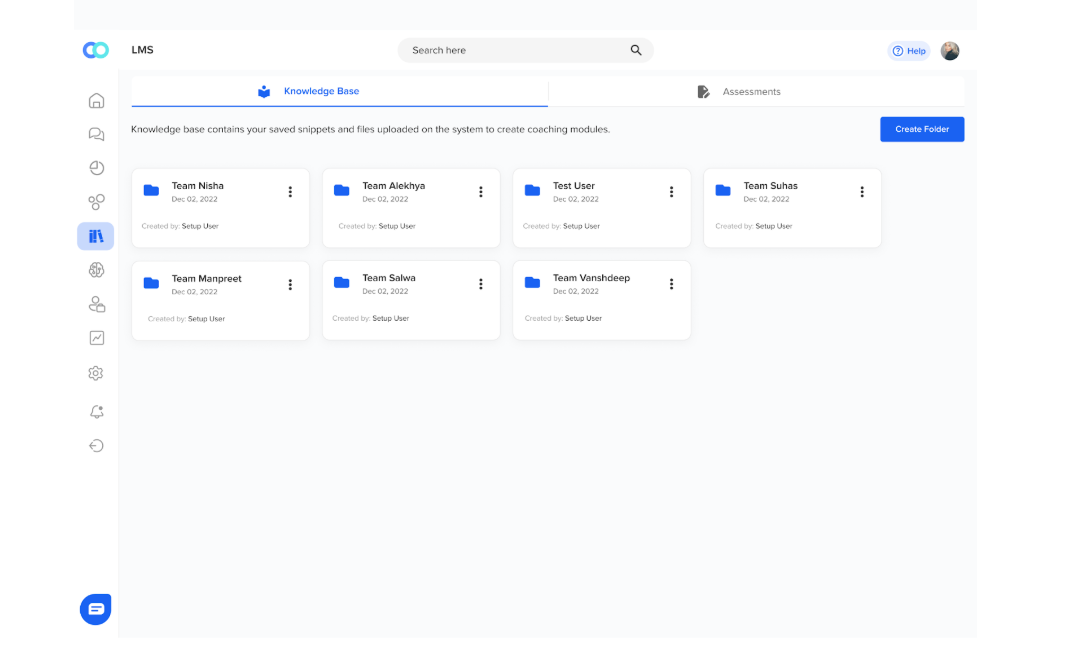
- Strategy: Ensure all team members understand the importance of online reputation and are trained to contribute positively.
- Example: Conduct regular training sessions on best practices for interacting with customers online and managing feedback.
- Impact: A well-informed team can act as brand ambassadors, consistently contributing to a positive online reputation.
10. Develop an Online Reputation Crisis Management Plan
- Strategy: Prepare a detailed plan to address potential online reputation crises, outlining specific steps and communication protocols.
- Example: Create a response matrix that defines different types of online crises and the corresponding actions to take, including who in your team is responsible for what.
- Impact: A crisis management plan can mitigate the damage of a reputation crisis, allowing your business to respond effectively and maintain trust with your audience.
By implementing these strategies, small businesses can proactively manage their online reputation, turning it into a powerful asset that drives growth and fosters trust with customers.
Cut handle time using Convin's Real-Time Agent Assist!
Enhance Your Reputation Management Strategy Effectively
Convin empowers businesses to streamline and strengthen their reputation management strategy through real-time insights, automated feedback, and intelligent coaching. Here's how it adds measurable value to your ORM efforts.
1. Sentiment Analysis
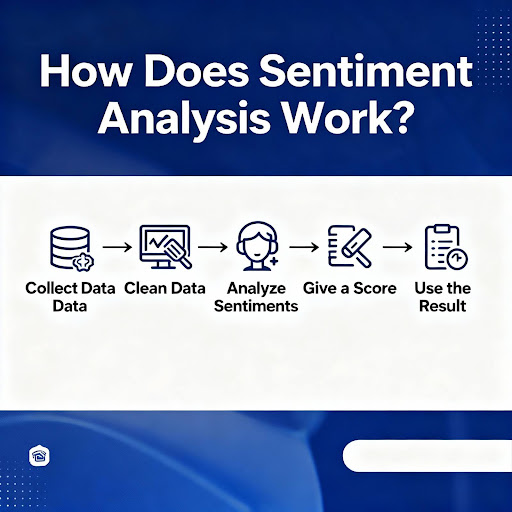
- Insight into Customer Emotions: Convin's sentiment analysis deciphers the emotional tone behind customer interactions, providing insights into how customers truly feel about your service or product.
- Example: If sentiment analysis reveals a trend of dissatisfaction in customer feedback, you can quickly address the underlying issues, preventing negative online reviews.
2. Real-Time Agent Assist (Call Script and Suggestions)
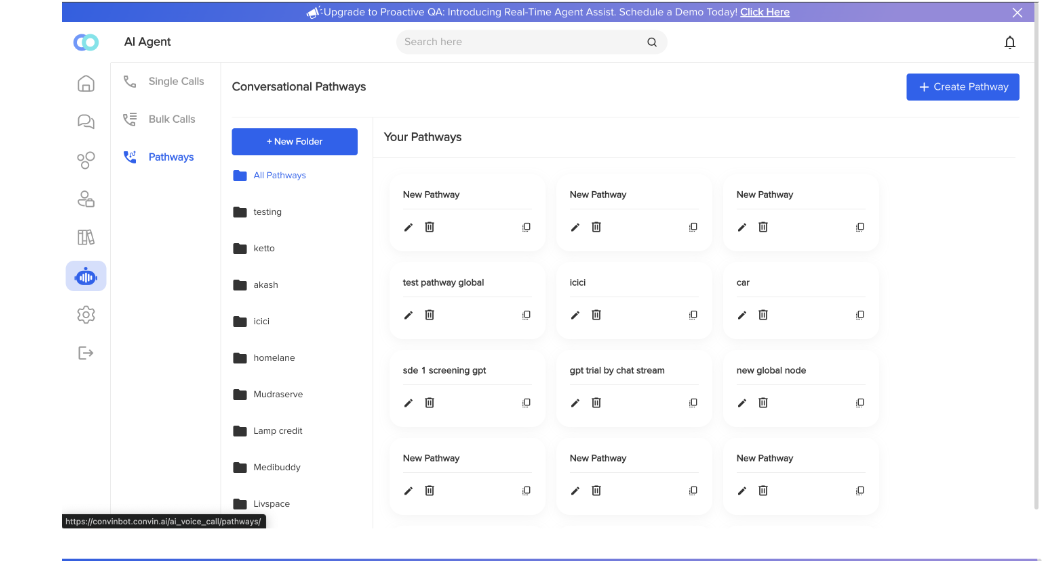
- Enhanced Customer Interactions: Convin’s Agent Assist provides real-time call scripts and suggestions, ensuring customer service agents deliver consistent, accurate, and helpful information during every interaction.
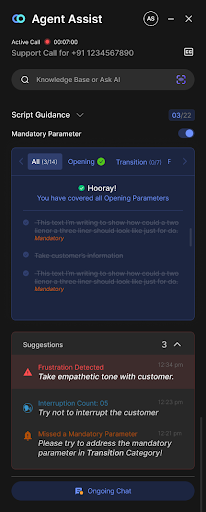
- Example: If an agent is on a call with a customer who is upset about a late delivery, Agent Assist can offer real-time suggestions on how to empathize with the customer and offer practical solutions, thereby improving the call's outcome and the customer's perception of the business.
3. Automated Coaching (Personalized Coaching and Request Assessment)

- Tailored Agent Improvement: Convin’s automated coaching system analyzes past interactions to offer personalized coaching and assessments for each agent, targeting specific areas for improvement.
- Example: After reviewing several calls, Convin might identify that an agent struggles with closing conversations effectively. The system then provides personalized coaching sessions to improve this skill, leading to better customer experiences and enhancing the business's online reputation as customers share their positive interactions.
4. Auto Quality Management (Call Score and AI Feedback)
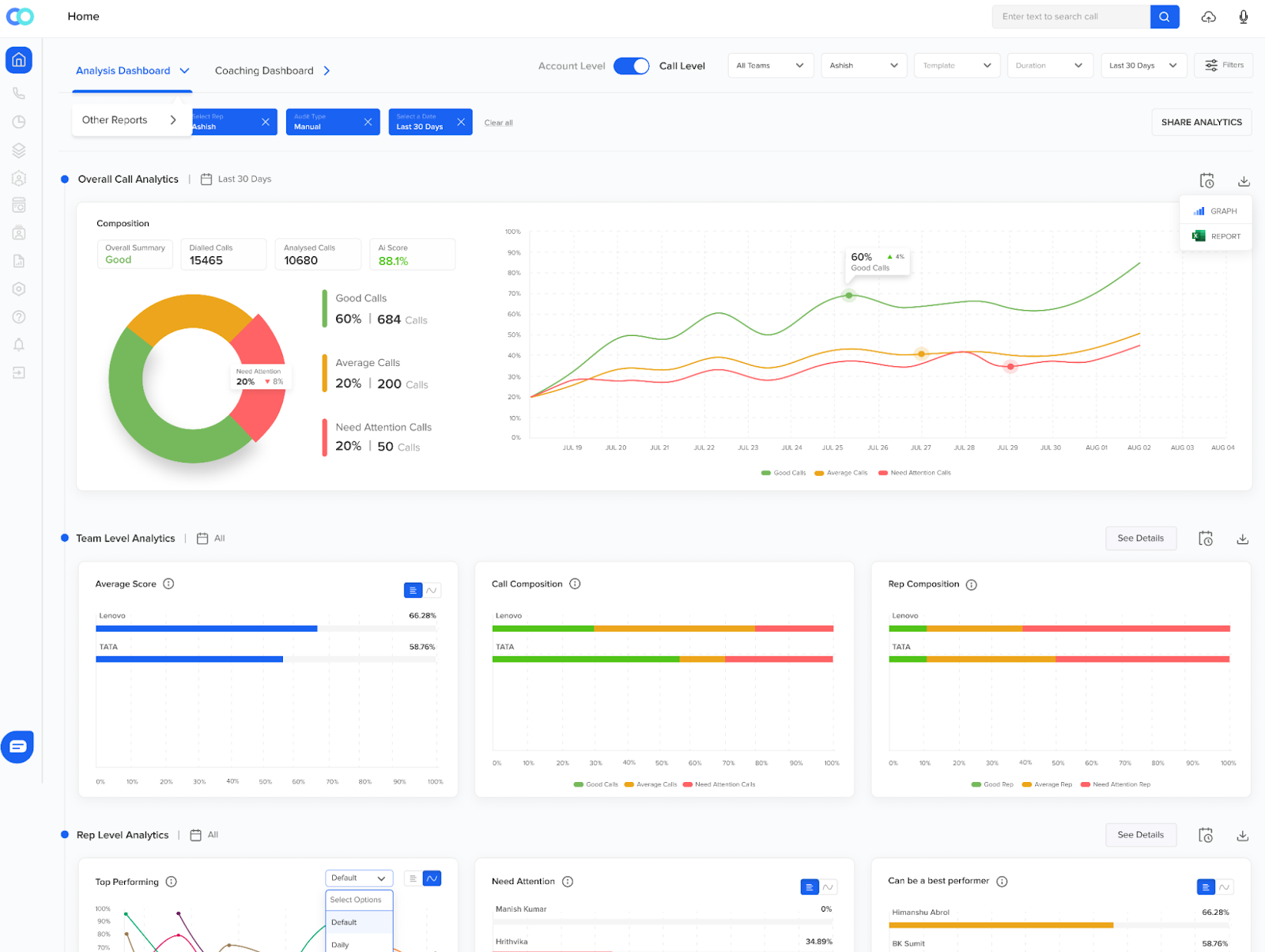
- Consistent Quality Monitoring: Convin’s auto quality management evaluates every customer interaction, assigns a call score, and provides AI-generated feedback, ensuring that quality is consistently high.
- Example: If an agent's call score dips below a certain threshold, Convin’s AI feedback will highlight this issue and suggest specific areas for improvement. Over time, this leads to higher quality interactions, which customers are likely to mention in positive online reviews, thereby bolstering the business's online reputation.
By integrating these features, small businesses can not only refine their customer service approach but also actively enhance their online reputation. Positive customer interactions lead to favorable reviews and feedback, significantly impacting how potential customers perceive the business online.
In this way, Convin acts as a strategic partner in managing and improving the digital face of small businesses, turning each customer interaction into an opportunity to enhance the business's online reputation.
Fix Agent Gaps Fast with Automated Coaching.
ORM Strategy Summed Up
As you implement these ORM strategies and leverage sophisticated tools like Convin, you're not just managing your reputation; you're steering your business toward sustained growth and success.
Effective online reputation management is an ongoing commitment to excellence, a dialogue with your audience, and a strategic component of your business growth. By embracing ORM, you're not just participating in the digital conversation about your brand, you're leading it, shaping a narrative that resonates with your values and vision.
Unlock the answers to the online reputation management for your business; schedule your demo with Convin today!
FAQs
1. What are the four 4 tips to manage online reputation easily?
- Regularly monitor online mentions and reviews to stay informed about what's being said about your business.
- Engage proactively with your audience by responding to feedback and participating in conversations.
2. What are reputation management strategies?
Strategies include monitoring your online presence, responding to feedback, encouraging positive reviews, and addressing negative comments constructively.
3. What are 5 strategies you would use to ensure that your online reputation was protected?
Monitor your digital footprint, respond to feedback positively, encourage satisfied customers to leave reviews, address negative comments diplomatically, and create quality content that reflects your brand positively.
4. What are the steps in online reputation management?
Monitor your reputation, respond to feedback, improve based on feedback, and promote positive content about your brand.
5. What are the 3 elements of measuring online reputation?
The volume of mentions, sentiment analysis (positive, neutral, negative), and influence or reach of those mentioning your brand.




%20BLOG10%20examples%20of%20artificial%20intelligence%20in%202024.webp)



.avif)